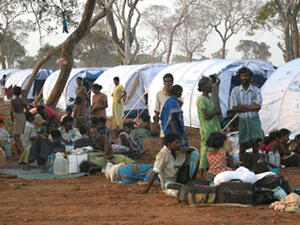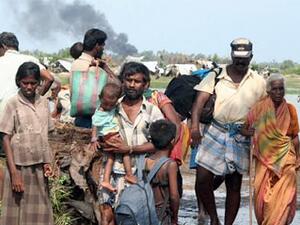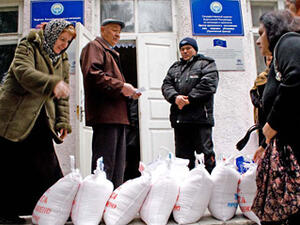UNHCR seeks to help refugees encamped at Monrovia office
UNHCR seeks to help refugees encamped at Monrovia office

Many Sierra Leonean refugees have been displaced by recent fighting around Monrovia.
MONROVIA, Liberia, June 12 (UNHCR) - As the Liberian capital of Monrovia resumed a semblance of normalcy today, the UN refugee agency has been busy exploring ways to help a number of Sierra Leonean refugees who have gathered in front of the agency's office this week.
UNHCR's partner MERLIN, a medical non-governmental organisation (NGO), has brought water bladders for the 300 to 400 Sierra Leonean refugees encamped around UNHCR's office in the Mamba Point area since the beginning of the week. They have come from camps around Monrovia, which were in recent days overtaken by fighting as LURD (Liberians United for Reconciliation and Democracy) rebels gained ground against President Charles Taylor's forces on the outskirts of the city.
On Thursday, UNHCR's local staff held a meeting with representatives of the Liberian government's refugee commission to discuss possible solutions. The UNHCR staff suggested finding a place to relocate these Sierra Leonean refugees or to find a way to deliver some basic assistance in the UNHCR compound without attracting more displaced people.
"The refugees mainly come into the UNHCR compound at night for safety," said UNHCR local staff who are continuing basic work at the office each day. "They are all in good health and have access to an MSF-run clinic located near the office. An ambulance is also available for emergency purposes."
However, food is scarce in the area, and the situation may become problematic if a solution is not found quickly.
UNHCR also raised concerns about access to its four refugee camps, which are situated in off-limit areas around Monrovia. The agency has maintained minimal radio contact with Samukai camp, located in a government-controlled area, but it has lost contact with the other three camps, VOA, Banjor and Zuannah, which are caught in rebel-controlled areas.
The general security situation in the camps was also a serious concern amid reports of widespread looting and harassment around the capital. UNHCR has obtained assurance from the Liberian government that it would help to secure the camps wherever possible.
The four camps were hosting about 15,000 Sierra Leonean refugees when the fresh round of hostilities started.
A repatriation operation to Sierra Leone had been ongoing since last year. In January this year, UNHCR started actively promoting returns, given the improved situation in Sierra Leone and the deteriorating situation in Liberia. But so far in 2003, only 2,000 Sierra Leonean refugees have responded positively, a situation that is causing great concern to UNHCR.
A total of 19,000 had already returned last year, most of them with UNHCR assistance, even though the agency had to face difficult security and financial circumstances to keep repatriation going.
Some 15 UNHCR local staff have kept the agency's Monrovia office running since the three remaining international staff were evacuated to Abidjan on Monday, together with 500 other UN staff, NGO and embassy personnel. The humanitarian community is closely following developments around the cease-fire negotiations, and is preparing a strategy for return to Liberia as soon as the situation allows.
The Liberian capital was said to be calm on Thursday. UNHCR staff reported that "the situation has been quiet since yesterday. The population is moving around and some shops have finally opened their doors."
On Wednesday, UNHCR staff in Monrovia took part in an inter-agency assessment mission to major displaced centres in and around Monrovia. Tens of thousands of displaced people have gathered at a stadium and in schools, following the brutal rebel advance in the outskirts of the city. The team visited the Samuel K Doe Sport Stadium, where at least 30,000 persons have been registered, as well as several schools.
The purpose for UNHCR was to determine if there were any refugees among them and how best to help them. So far, only small numbers of Sierra Leonean refugees who fled VOA camp have sought refuge in one of the schools.
UNHCR believes it is highly likely that most Sierra Leonean refugees at the three camps which were overrun by rebels have dispersed together with the local population, leaving the camps empty.
In each of the centres, the UNHCR team distributed forms to register refugees who might present themselves. Although there were no reports of harassment in any of the centres, the agency warned of the risk of sexual violence, given the congested living conditions, and health risks due to deplorable water and sanitation conditions.
The humanitarian community that remained in Monrovia - international staff of the ICRC (International Committee of the Red Cross) and MSF (Médecins Sans Frontières) as well as local NGO staff - is planning co-ordinated assistance to the displaced centres.
UNHCR is hopeful that the recent verbal agreement on cessation of hostilities in Liberia represents a step in the right direction, and calls on all parties to urgently reach a negotiated solution for the strife-torn country. The agency has also joined the humanitarian community in appealing for an improvement to the current climate, in order to allow humanitarian agencies to resume operations soon.









